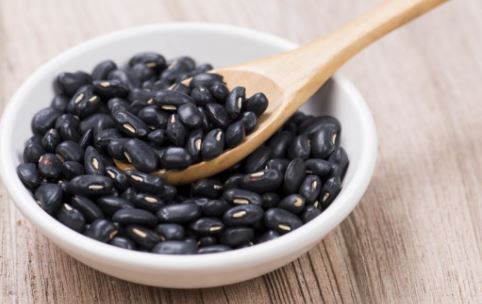
Black beans are classified as legumes. Also known as turtle beans because of their hard, shell-like appearance, black beans are, in fact, the edible seeds of the plant.
Like other legumes, such as peanuts, peas, and lentils, black beans are prized for their high protein and fiber content. They also contain several other key vitamins and minerals that are known to benefit human health.
1. Maintaining healthy bones
The iron, phosphorus, calcium, magnesium, manganese, copper, and zinc in black beans all contribute to building and maintaining bone structure and strength.
Calcium and phosphorus are important in bone structure, while iron and zinc play crucial roles in maintaining the strength and elasticity of bones and joints.
Roughly 99 percent of the body’s calcium supply, 60 percent of its magnesium, and 80 percent of its phosphorus stores are contained in bone. This means it is extremely important to get enough of these nutrients from the diet.
2. Lowering blood pressure
Maintaining a low sodium intake is essential for keeping blood pressure at a normal level. Black beans are naturally low in sodium and contain potassium, calcium, and magnesium, all of which have been found to decrease blood pressure naturally.
Be sure to purchase low sodium canned options and still drain and rinse to further reduce sodium content.
3. Managing diabetes
Studies have shown that individuals with type 1 diabetes who consume high-fiber diets have lower blood glucose levels. Additionally, people with type 2 diabetes may have improved blood sugar, lipids, and insulin levels. One cup, or 172 grams (g), of cooked black beans contributes 15 g of fiber.
A study recommends 25 g of fiber per day based on a 2,000-calorie diet. This may vary depending on overall intake of calories.
4. Warding off heart disease
The fiber, potassium, folate, vitamin B6, and phytonutrient content of black beans, coupled with its lack of cholesterol, all support heart health. This fiber helps lower the total amount of cholesterol in the blood and decrease the risk of heart disease.
Vitamin B6 and folate prevent the buildup of a compound known as homocysteine. When excessive amounts of homocysteine accumulate in the body, it can damage blood vessels and lead to heart problems.
The quercetin and saponins found in black beans also aid in cardio protection. Quercetin is a natural anti-inflammatory that appears to reduce the risk of atherosclerosis and protect against the damage caused by low-density lipoprotein (LDL) cholesterol.
5. Preventing cancer
Selenium is a mineral that is not present in most fruits and vegetables but can be found in black beans. It plays a role in liver enzyme function and helps detoxify some cancer-causing compounds in the body. Additionally, selenium may prevent inflammation and decreases tumor growth rates.
Saponins prevent cancer cells from multiplying and spreading throughout the body. Fiber intakes from fruits and vegetables like black beans are associated with a lowered risk of colorectal cancer.
6. Healthy digestion
Because of their fiber content, black beans help to prevent constipation and promote regularity for a healthy digestive tract. They also provide fuel for the healthy bacteria in the colon.
7. Weight loss
Dietary fiber is commonly recognized as an important factor in weight loss and weight management by functioning as a “bulking agent” in the digestive system. High fiber foods increase the sense of fullness after eating and reduce appetite, making an individual feel fuller for longer, thereby lowering overall calorie intake.
Many studies have suggested that increasing consumption of plant foods like black beans decreases the risk of obesity, diabetes, heart disease, and overall mortality while promoting a healthy complexion and hair, increased energy, and overall lower weight.

